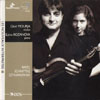Ravel/Schnittke/Szymanowski - Works for Violin and Piano
Technically splendid playing, full of colour and energy, but spoilt by disregard for detail
View record and artist detailsRecord and Artist Details
Composer or Director: Maurice Ravel, Alfred Schnittke, Karol Szymanowski
Label: Les Nouveaux Interprètes
Magazine Review Date: 10/2000
Media Format: CD or Download
Media Runtime: 56
Mastering:
DDD
Catalogue Number: HMN911701

Tracks:
| Composition | Artist Credit |
|---|---|
| Tzigane |
Maurice Ravel, Composer
Elena Rozanova, Piano Graf Mourja, Violin Maurice Ravel, Composer |
| Sonata for Violin and Piano |
Maurice Ravel, Composer
Elena Rozanova, Piano Graf Mourja, Violin Maurice Ravel, Composer |
| Sonata for Violin and Piano No. 1 |
Alfred Schnittke, Composer
Alfred Schnittke, Composer Elena Rozanova, Piano Graf Mourja, Violin |
| Nocturne and Tarantella |
Karol Szymanowski, Composer
Elena Rozanova, Piano Graf Mourja, Violin Karol Szymanowski, Composer |
Author: rnichols
The choice of items is certainly intelligent: all four pieces demand virtuoso techniques from both players, but also something more. Mourja is as well armed a fiddler as you can find, and his secure, incisive bowing is heard to advantage at the start of the Schnittke second movement, but one can also admire the way he sets the sparky off against the lyrical, the dancelike against the ruminative, with Rozanova matching him in range of colour and accuracy. The Szymanowski also benefits from a liberal helping of un-Cartesian passion.
I have a few quibbles about their freedom with Ravel’s markings in Tzigane, such as Mourja’s inserted piano in the opening paragraph and the delay in the diminuendo at fig 25 – it’s not on the second bar of the Meno vivo, but on the piano’s descending trait. Harder, and more effective. But then it doesn’t seem as though Ravel ever set much store by this piece, which he wrote really for fun, so it probably doesn’t do to be too fussy. The Sonata, though, is a quite different matter, and here the deformations of dynamics and especially of tempo are more than unfortunate. Performers should note that the only two changes of tempo within movements both come in the last eight bars of the first movement. Elsewhere, all is implacability – or should be. Here the tempo quickens through the blues movement before slowing disastrously at the end, and the first 10 bars of the finale are then ruined by sentimental little ritardandos at the ends of phrases. If I were world dictator I should have the letters RKB printed at the top of every Ravel score: Ravel Knew Best.'
I have a few quibbles about their freedom with Ravel’s markings in Tzigane, such as Mourja’s inserted piano in the opening paragraph and the delay in the diminuendo at fig 25 – it’s not on the second bar of the Meno vivo, but on the piano’s descending trait. Harder, and more effective. But then it doesn’t seem as though Ravel ever set much store by this piece, which he wrote really for fun, so it probably doesn’t do to be too fussy. The Sonata, though, is a quite different matter, and here the deformations of dynamics and especially of tempo are more than unfortunate. Performers should note that the only two changes of tempo within movements both come in the last eight bars of the first movement. Elsewhere, all is implacability – or should be. Here the tempo quickens through the blues movement before slowing disastrously at the end, and the first 10 bars of the finale are then ruined by sentimental little ritardandos at the ends of phrases. If I were world dictator I should have the letters RKB printed at the top of every Ravel score: Ravel Knew Best.'
Discover the world's largest classical music catalogue with Presto Music.

Gramophone Digital Club
- Digital Edition
- Digital Archive
- Reviews Database
- Full website access
From £8.75 / month
Subscribe
Gramophone Full Club
- Print Edition
- Digital Edition
- Digital Archive
- Reviews Database
- Full website access
From £11.00 / month
Subscribe
If you are a library, university or other organisation that would be interested in an institutional subscription to Gramophone please click here for further information.





